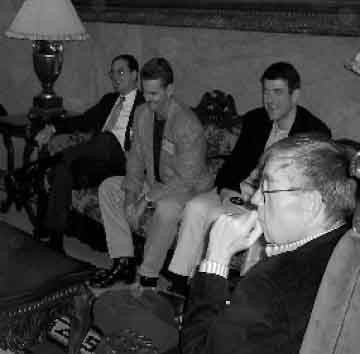In any age, Samuel Francis would have been a remarkable man for the penetration of his mind, his unflinching pursuit of truth—regardless of current cant or personal consequences—and the gravity of his style. In our age, he is peerless, and his death represents an irreplaceable loss.
Sam and I were friends and allies for over 35 years, and, although we had an occasional falling-out—once for many months—I never ceased admiring his work and his character. A gentleman of a school so old we can no longer recognize its existence, Sam never talked of his “feelings,” and, if one spoke of loyalty or friendship, he was sure to make an ironic quip. Nonetheless, I learned early on that he was loyal to his friends even (especially) when it entailed a threat to his own interest. In so many ways, he was the opposite of most conservatives. He rarely talked a good game, but he always played one.
Sam’s deep sense of loyalty became very apparent during the struggle, in the first term of the Reagan administration, over M.E. Bradford’s proposed nomination as head of the National Endowment for the Humanities. This was the first occasion on which the neoconservatives showed their hand, and none of Mel’s friends—least of all Sam—has ever forgotten the dirty part played by Irving Kristol, George Will, and the head of a leading conservative think tank. As an assistant to Sen. John East, Sam worked tirelessly, both on the Hill and among conservatives, to support his friend’s nomination, but to no avail. Too many true-blue Reagan “conservatives” either did not care or simply looked the other way. This was the first of many defeats in which Sam showed himself an American Cato.
I first met Sam Francis when we were both in graduate school at Chapel Hill. The year was probably 1969 or 1970. I had been hearing tales of a conservative society on campus and of a brilliant student of English history with a Machiavellian grasp of political reality. E. Christian Kopff, a fellow student in classics and a member of the conservative society, arranged a lunch with Sam. I do not recall much of what we talked about, though I do remember disagreeing with Sam and Chris on the subject of American Indians, who, I felt then as I feel now, had been treated unworthily by a supposedly Christian people—the last indignity being the welfare system that has degraded them. It was a friendly disagreement, though, and for the most part, I discovered that Sam and I stood on common ground.
I did not regard myself as a conservative at the time, though my views on tradition, literary form, manners, and moral decency were already well formed. Where I parted company with the young conservatives was not in their respect for Burke or the constitutional order but in what seemed to me a strange respect for the journalists and politicians who led the conservative movement. It would not be too many years before I considered myself a conservative or before my conservative friends adopted a more realistic approach to “the movement.”
Sam, Chris, and Clyde Wilson—whom I did not meet until later—were the core of the conservative group, which had an unlikely faculty friend and mentor in the moderate Republican John Shelton Reed. I saw little, if anything, of Sam until he returned to defend his dissertation. We met at the home of Robert Hickson, a West Pointer who had served in Southeast Asia and was now pursuing medieval studies. Bob had sat in on at least one of the classes I was teaching.
When I returned to South Carolina, after several years at Miami of Ohio, I remained in touch with Dr. Kopff, who, on one of his frequent visits to our little cottage, suggested that we drive up to Columbia to see Clyde Wilson. Later, when I proposed to Clyde that we start a conservative Southern journal, the first people we brought into the project were Sam Francis, John Reed, and Chris Kopff. Thus was born the short-lived and ill-fated “Chapel Hill Mafia” or, as Walker Percy once called it, the “Tarheel conspiracy.” When I came to Chronicles, Sam was already writing occasionally for the magazine, but, when I became editor, we quickly agreed that he would become Washington editor, a position he retained up to his death. (We broadened his title to political editor in recent years.)
Sam Francis was a skeptic about most things, including religion. Some of his resentment against what he saw as the liberal influence of Christianity had been abating, however, and I have good reason to believe that he met his end as a Christian.

Leave a Reply